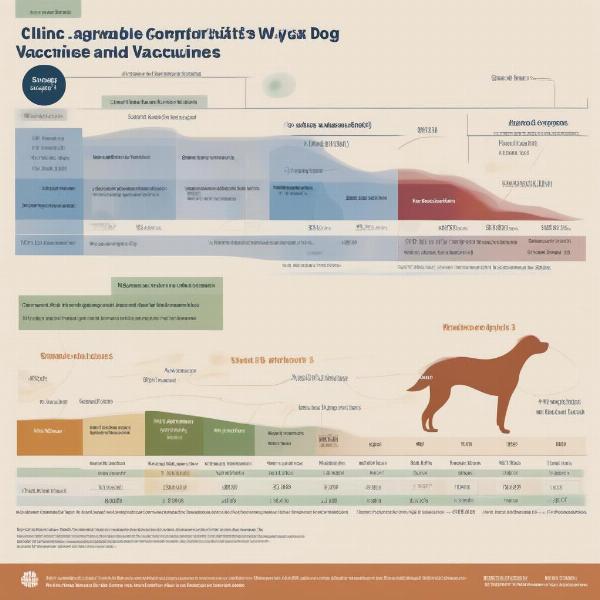The 9 way dog vaccine, also known as the DHPPvL4, is a crucial part of protecting your canine companion from several serious and potentially fatal diseases. This comprehensive guide will cover everything you need to know about the 9 way vaccine, from understanding its components to scheduling appointments and addressing potential side effects. Whether you’re a new dog owner or a seasoned pro, this information will help you make informed decisions about your dog’s health.
Canine distemper, parvovirus, adenovirus type 2, hepatitis, parainfluenza, and leptospirosis are some of the highly contagious and severe canine illnesses that the 9-way dog vaccine protects against. Understanding the importance of this vaccine, the recommended vaccination schedule, and potential side effects is vital for every dog owner. This guide will provide a detailed explanation of each component of the 9 way vaccine, address common concerns, and offer practical advice to ensure your furry friend stays healthy and protected.
Deciphering the 9 Way Dog Vaccine
The “9 way” designation refers to the nine different diseases this vaccine protects against. These include:
- Canine Distemper: A highly contagious viral illness affecting the respiratory, gastrointestinal, and nervous systems.
- Canine Parvovirus: A severe and often fatal viral infection causing vomiting, diarrhea, and dehydration, especially in puppies.
- Canine Adenovirus Type 2 (CAV-2): Causes respiratory illness and contributes to canine infectious tracheobronchitis (kennel cough).
- Canine Adenovirus Type 1 (CAV-1): Protects against infectious canine hepatitis, a severe liver infection.
- Canine Parainfluenza: A highly contagious viral infection causing respiratory illness and kennel cough.
- Leptospirosis (4 serovars): A bacterial infection that can cause kidney and liver damage and can be transmitted to humans.
Why is the 9 Way Vaccine Important?
These diseases can have devastating consequences for your dog’s health, ranging from mild discomfort to severe illness and even death. Vaccinating your dog not only protects them but also helps prevent the spread of these diseases within the canine population. Especially for puppies with developing immune systems, the 9 way vaccine is crucial for early protection.
9 Way Vaccine Schedule: What to Expect
Puppies typically receive a series of 9 way vaccinations starting around 6-8 weeks of age, followed by boosters every 3-4 weeks until they are 16-20 weeks old. Adult dogs require booster shots every 1-3 years, depending on their lifestyle and risk factors. Consult your veterinarian to determine the best vaccination schedule for your dog.
Potential Side Effects of the 9 Way Vaccine
While the 9 way vaccine is generally safe, some dogs may experience mild side effects, such as:
- Soreness at the injection site
- Lethargy
- Decreased appetite
- Mild fever
These side effects are usually temporary and resolve within a few days. However, in rare cases, more serious allergic reactions can occur. If you notice any unusual symptoms, contact your veterinarian immediately.
What Does the 9 Way Dog Vaccine Cost?
The cost of the 9 way vaccine can vary depending on your location and veterinary clinic. It’s important to factor this cost into your dog’s annual healthcare budget.
 Cost of 9 Way Dog Vaccine: Comparison chart showing average costs
Cost of 9 Way Dog Vaccine: Comparison chart showing average costs
Conclusion
The 9 way dog vaccine is a vital part of responsible dog ownership, providing essential protection against serious and potentially life-threatening diseases. By understanding the components of the vaccine, its importance, and the recommended vaccination schedule, you can help keep your furry friend healthy and happy for years to come. Remember to consult with your veterinarian for personalized advice and to address any concerns you may have.
FAQs
- Is the 9 way vaccine necessary for all dogs? While highly recommended, your veterinarian can assess your dog’s individual risk factors and recommend the most appropriate vaccination protocol.
- What if I miss a booster shot? Contact your veterinarian as soon as possible to reschedule. They will determine the best course of action based on your dog’s vaccination history.
- Can adult dogs get the 9 way vaccine? Yes, adult dogs require booster shots to maintain immunity throughout their lives.
- What should I do if my dog experiences side effects? Monitor your dog closely and contact your veterinarian if you notice any unusual or concerning symptoms.
- Are there any alternatives to the 9 way vaccine? Discuss alternative vaccination protocols with your veterinarian to determine the best approach for your dog’s specific needs.
- Can I give my dog the 9 way vaccine myself? No, the 9 way vaccine should only be administered by a licensed veterinarian.
- How effective is the 9 way vaccine? The 9 way vaccine is highly effective in preventing the diseases it covers, but no vaccine is 100% guaranteed.
Related Articles:
- 9 way vaccine for dogs
- free shots for dogs in dallas
- where to buy 5 in 1 vaccine for dogs
- free dog vaccinations utah
About ILM Dog:
ILM Dog is your trusted resource for expert dog care advice. We cover a wide range of topics, from breed selection and health care to training, nutrition, grooming, and finding the best products and accessories for your canine companion. We are committed to providing you with the most up-to-date information and practical tips to help you navigate every aspect of dog ownership. For any inquiries, contact us at [email protected] or call us at +44 20-3965-8624.